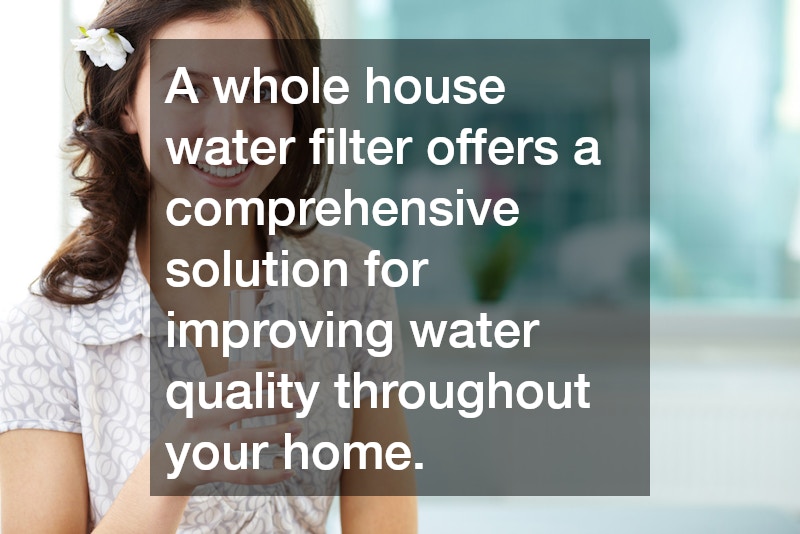Water quality is essential for every household, yet many people unknowingly deal with water that contains impurities such as chlorine, sediment, heavy metals, and other contaminants. These unwanted substances can affect not only the taste and smell of your water but also your health and the longevity of your plumbing and appliances. While some homeowners rely on bottled water or point-of-use filters at the kitchen sink, these solutions only address a small portion of your home’s water use. Installing a whole house water filter ensures that every tap, shower, and appliance receives clean, filtered water, vastly improving the overall water quality in your home.
What Is a Whole House Water Filter?
A whole house water filter is a system installed at the main water supply line of your home, designed to filter all the water before it reaches your faucets or appliances. Unlike filters that treat water at a single point, this filtration system works to clean every drop that flows through your home.
It utilizes multiple filtration stages, often combining sediment filtration to remove dirt and rust particles with activated carbon media that absorbs chlorine and chemicals responsible for bad taste and odors. Depending on your water source and quality issues, additional specialized media may be used to remove iron, sulfur, or even microorganisms. This comprehensive approach results in cleaner, safer, and better-tasting water for all household needs.
Benefits of Installing a Water Filter
A whole-house filtration system removes contaminants that affect water taste and safety, making water more enjoyable for drinking and cooking. It protects your plumbing and appliances by reducing sediment and scale buildup, which can clog pipes and decrease appliance efficiency. Softer, filtered water is gentler on skin and hair, preventing dryness and irritation often caused by chemicals and minerals. Beyond the physical benefits, having a system that filters all your home’s water provides unmatched convenience and peace of mind. You no longer have to worry about which tap is filtered or buy bottled water for drinking or cooking. The system works continuously and automatically, delivering clean water from every faucet and showerhead.
How the Filtration Process Works
The filtration process in a whole-house water filter typically starts with a sediment filter that captures larger particles such as dirt, rust, and sand. This first stage protects downstream filters and plumbing from damage. Next, activated carbon filters work to remove chlorine, chloramines, and various organic compounds that cause bad tastes and odors. Some systems include additional stages with specialized media designed to remove iron, sulfur, or microbial contaminants, particularly if the water is sourced from wells. These multiple stages operate in sequence, ensuring that water entering your home is thoroughly treated. The filtration system is installed where the water line enters your property, so all water used inside the home is filtered before reaching any tap or appliance.
When You Should Consider Installing One
Many homeowners remain unaware of their water quality issues until signs begin to show. If your tap water has a strong chemical or chlorine smell and taste, appears cloudy, or contains visible particles, these are indicators that filtration could improve the water. Stains or discoloration on sinks, tubs, or laundry can also point to sediment or mineral problems. Frequent plumbing or appliance breakdowns caused by scale buildup or corrosion may be a sign that your water is damaging your home’s infrastructure. Additionally, if you experience dry or itchy skin and dull hair after showering, it may be due to the presence of harsh chemicals or minerals in your water. Relying on bottled water because your tap water tastes unpleasant or smells bad is another strong reason to invest in a whole house filtration system.
Maintaining Your Home Water Filter
Maintaining a water filter is straightforward but essential for ensuring consistent water quality. Most systems require replacing the filter cartridges or regenerating the filtration media periodically, depending on your water usage and quality. Many modern units have indicator lights or alerts to notify you when it’s time for maintenance. Failure to replace filters can reduce filtration efficiency, cause pressure drops in your plumbing, and allow contaminants to bypass the system. Regular upkeep will extend the life of your filtration system and help it operate smoothly for many years.
A whole house water filter offers a comprehensive solution for improving water quality throughout your home. By removing a broad range of contaminants, it not only enhances the taste and smell of your water but also protects your plumbing and appliances from damage caused by sediment and minerals. The benefits extend to healthier skin and hair as well, making daily living more comfortable. With the convenience of filtered water available at every tap and shower, you gain peace of mind knowing your family’s water is clean and safe. Proper maintenance ensures that your system continues to function efficiently, delivering lasting protection and improved water quality for years to come. Investing in this type of filtration system is a smart decision that improves health, saves money on repairs and energy costs, and elevates your home’s overall water experience.





